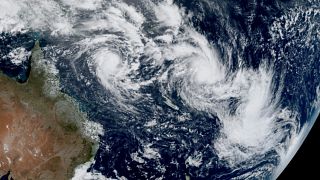Mozambique
Cyclone Chido struck Mozambique on Sunday, unleashing powerful winds and raising alarms about potential devastation after traversing islands in the southeastern Indian Ocean.
Footage shared by the UN Children's Fund (UNICEF) revealed boats wrecked along the shore and palm trees bending under the force of the winds.
Cabo Delgado province, which is home to approximately 2 million residents, has suffered significant damage, according to the agency.
Guy Taylor, the chief advocacy and communications officer for UNICEF Mozambique, shared his observations from Pemba, the capital of Cabo Delgado Province in northern Mozambique.
This morning, Cyclone Chido made landfall as a powerful tropical cyclone, unleashing severe winds and heavy rainfall.
“UNICEF is concerned about the immediate impacts of this cyclone: the loss of life, the damage to schools, to people's homes, to health care facilities. We're also worried about the longer term impacts: children potentially being cut off from learning for weeks on end, people unable to get access to health care and the potential spread of waterborne diseases like cholera and malaria,” he said.
Taylor added in a video, that communities might find themselves isolated from schools and healthcare services for an extended period.
The storm has claimed at least 11 lives in the French territory of Mayotte, with the nearby islands of Comoros and Madagascar also feeling its impact.
The cyclone season in the southeastern Indian Ocean runs from December to March, and southern Africa has faced a series of intense storms in recent years.
Cyclone Idai in 2019 resulted in over 1,300 fatalities across Mozambique, Malawi, and Zimbabwe.
Last year, Cyclone Freddy caused more than 1,000 deaths across multiple countries.
These cyclones pose threats of flooding and landslides, and the stagnant water left behind can lead to outbreaks of waterborne diseases like cholera, as well as dengue fever and malaria.
Research indicates that the severity of these cyclones is increasing due to climate change.
This situation forces impoverished nations in southern Africa, which contribute minimally to global warming, to confront significant humanitarian crises, highlighting their urgent need for assistance from wealthier countries to address the effects of climate change.











02:17
Art meets activism in Congo with ‘The Herds’ performance
04:49
Ghana: Volta Region's Ketu South declares emergency amid tidal threats
01:00
Survivors remember Turkey's deadly 2023 earthquake
01:40
Schools in Mayotte prepare to reopen after devastating Cyclone Chido
01:07
Vanuatu holds snap election a month after destructive earthquake
Go to video
California wildfires threaten to widen inequality